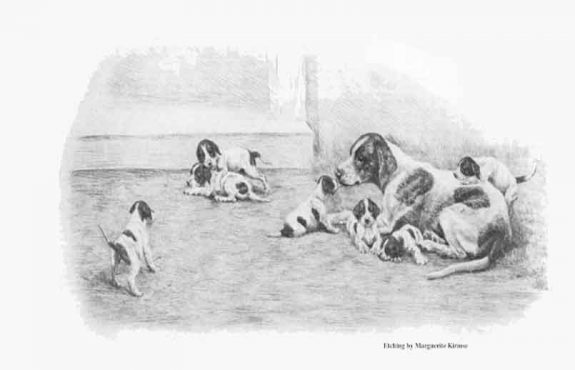
A “Stud Book” is an old livestock term that refers to keeping the genetic records of registered animals. It is originally based on generations of livestock registries that include thoroughbred horses, cattle, and racing Greyhounds. With regards to the AKC, its Stud Book is the official record of AKC-registered dog breedings which includes the names and immediate lineage of each and every AKC registered dog used for breeding within the United States and abroad. By 1878, Dr. N. Rowe had already assembled three volumes of The National American Kennel Club Stud Book, and subsequently offered these three initial volumes gratis to the AKC.
Years later in 1898, Chauncey Zachariah Bennett founded the United Kennel Club to underscore the importance of the working dog (a concept the UKC now refers to as the “total dog), and it, too, included a stud book.
The oldest purebred dog registry in the United States, however, is the Field Dog Stud Book published by the American Field Publishing Company. American Field has followed field trial sport in America since 1874, and this includes horseback stakes to walking events. Its records are comprised of several million dogs of all breeds. It provides certified lists of wins of field trial winners, registers kennel names and publishes quarterly booklets containing current registrations. For more than 100 years, registration was based on the veracity of the breeders and the accuracy of the information submitted on the breeding certificates.
These days, its job is a lot easier.
Soon after the 2004 National Championship was concluded, a rumor surfaced that the breeding of the winner was incorrect and misrepresented. There was only one way to prove or disprove rampant rumors, and that was with DNA. The sire of the winner was verified by DNA, but the dam was, in test laboratory paarlence, “excluded.” The dam’s owner directed the Field Dog Stud Book to investigate another bitch which DNA determined was the dam. The misrepresentation essentially rendered the dogs unregistered, and therefore unable to earn placements or be bred. The discovery through DNA of the true breeding, however, made them eligible for all of the above.
Science can be a wonderful aid for a stud book, and to learn more about stud books, check this out.
Image: Etching by Margaret Kirmse
